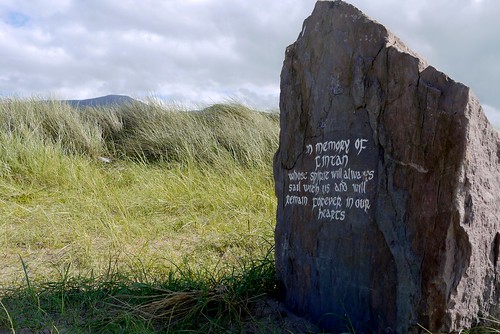Came on this while sorting through an SD card. Taken last Spring in a college garden.
How to write
So I decided to try to write the book I wanted to read. I wasn’t at all sure how to go about it. One evening, in New York, at a gathering of writers and historians interested in the West, my boss, Alvin Josephy, pointed to a white-haired man across the room. He said, That’s Harry Drago. Harry Sinclair Drago. He’s written over a hundred books. I waited for my chance and walked over. Mr. Drago, I said, Alvin Josephy says that you’ve written over a hundred books. Yes, he said, that’s right. How do you do that? I asked. And he said, Four pages a day. Every day? Every day. It was the best advice an aspiring writer could be given.
And, on avoiding the trap of the Whig Interpretation of history:
Thornton Wilder talked, in that Paris Review interview, about the difficulty of recreating the past: “It lies in the effort to employ the past tense in such a way that it does not rob those events of their character of having occurred in freedom.” That’s the difficulty exactly—how do you write about something that happened long ago in a way so that it has the openness, the feeling of events happening in freedom? How to write solid history and, at the same time, give life to the past and see the world as it was to those vanished people, with an understanding of what they didn’t know. The problem with so much of history as it’s taught and written is that it’s so often presented as if it were all on a track—this followed that. In truth, nothing ever had to happen the way it happened. Nothing was preordained. There was always a degree of tension, of risk, and the question of what was going to happen next. The Brooklyn Bridge was built. You know that, it’s standing there today, but they didn’t know that at the start. No one knew Truman would become president or that the Panama Canal would be completed.
From a marvellous Paris Review interview with David McCullough.
Phone-hacking: a thought experiment
From Peter Oborne, writing in The Spectator.
Let’s try a thought experiment. Let’s imagine that BP threw an extravagant party, with oysters and expensive champagne. Let’s imagine that Britain’s most senior politicians were there — including the Prime Minister and his chief spin doctor. And now let’s imagine that BP was the subject of two separate police investigations, that key BP executives had already been arrested, that further such arrests were likely, and that the chief executive was heavily implicated.
Let’s take this mental experiment a stage further: BP’s chief executive had refused to appear before a Commons enquiry, while MPs who sought to call the company to account were claiming to have been threatened. Meanwhile, BP was paying what looked like hush money to silence people it had wronged, thereby preventing embarrassing information entering the public domain.
And now let’s stretch probability way beyond breaking point. Imagine that the government was about to make a hugely controversial ruling on BP’s control over the domestic petroleum market. And that BP had a record of non-payment of British tax. The stench would be overwhelming. There would be outrage in the Sun and the Daily Mail — and rightly so — about Downing Street collusion with criminality. The Sunday Times would have conducted a fearless investigation, and the Times penned a pained leader. In parliament David Cameron would have been torn to shreds.
Instead, until this week there has been almost nothing, save for a lonely campaign by the Guardian. Because the company portrayed above is not BP, but News International, owner of the Times, the Sunday Times, the News of the World and the Sun, approximately one third of the domestic newspaper market. And last week, Jeremy Hunt ruled that Murdoch, who owns a 39 per cent stake in BSkyB, can now buy it outright (save for Sky’s news channel). This consolidates the Australian-born mogul as by far the most significant media magnate in this country, wielding vast political and commercial power.
Great stuff.
Why we need business models to support real journalism
Here’s a cautionary question for those of us who are gung-ho about the possibilities of the online world: where would the UK phone-hacking story be without the Guardian?
Answer: nowhere. The Murdoch political and news-management machine would have been able to get away with it. It was the Guardian that kept the phone-hacking story alive, long after most other journalistic institutions, Parliament, the police and the Press Complaints Commission had given up on it. One of the many reasons Peter Oborne’s Telegraph essay on the affair was so remarkable is that he paid tribute to the Guardian for performing “such a wonderful service to public decency by bringing to light the shattering depravity of Mr Murdoch’s newspaper empire”. For one British newspaper to pay tribute to another in this way is almost unprecedented, but in this case Oborne is right.
The really important point is that there are some things that can only be done by a properly organised and funded news organisation. Investigating a scandal like this requires great skill (of the kind displayed by Nick Davies and his colleagues), plus determination, courage and resources — legal and logistical. These don’t come cheap and have to be funded, somehow. I yield to nobody in my enthusiasm for what Charlie Beckett calls networked journalism, and I’m a great believer in harnessing collective IQ by crowdsourcing and so on, but a scandal like the illegal behaviour of the Digger’s satraps and their accomplices in the Metropolitan Police is unlikely to be exposed just by the Net. Much of the posturing by print media about how important newspapers are for democracy is just cant, because it confuses a format (the printed paper) with function (journalism). What matters — what democracy needs — is great journalism of the kind practised by Nick Davies and his colleagues. And that needs organisations — and business models — that can support it.
(Full disclosure: I write for the Guardian‘s sister paper, the Observer, but am not — and never have been — an employee, and these views are very much my own.)
The Chipping Norton Set: Dave Boy’s fatal mistakes
Terrific Torygraph column by Peter Oborne.
In the careers of all prime ministers there comes a turning point. He or she makes a fatal mistake from which there is no ultimate recovery. With Tony Blair it was the Iraq war and the failure to find weapons of mass destruction. With John Major it was Black Wednesday and sterling’s eviction from the Exchange Rate Mechanism. With Harold Wilson, the pound’s devaluation in 1967 wrecked his reputation.
Each time the pattern is strikingly similar. Before, there is a new leader with dynamism, integrity and carrying the faith of the nation. Afterwards, the prime minister can stagger on for years, but as increasingly damaged goods: never is it glad, confident morning again.
David Cameron, who has returned from Afghanistan as a profoundly damaged figure, now faces exactly such a crisis. The series of disgusting revelations concerning his friends and associates from Rupert Murdoch’s News International has permanently and irrevocably damaged his reputation.
Until now it has been easy to argue that Mr Cameron was properly grounded with a decent set of values. Unfortunately, it is impossible to make that assertion any longer. He has made not one, but a long succession of chronic personal misjudgments.
NoW Editor: “It woz the Web wot made me do it, yer honour”
Simon Jenkins, a former newspaper editor and one of the Guardian‘s most prominent columnists, has a rant today about the revelations of how far the News of the World’s hacking went. (They included hacking into the mobile phone of a murdered teenager — and deleting some messages in her voicemail — thereby encouraging her distraught parents to think that she might still have been alive.)
At first, Jenkins’s rant seems predictable. “Editors on a paper whose stock in trade is human anguish”, he writes,
appeared to lose all respect for the law, let alone self-control. The hacking into Milly Dowler’s phone was part of a culture of intrusion that seemed to know no bounds. It now appears to have extended to the Soham murder victims’ families. This stretches any public interest defence beyond credibility and taunts politicians to react with scourges against press freedom, for which there will now be strong public pressure”.
Quite. But now comes the extraordinary bit:
Pressure on editors and newspaper owners not just to “dumb down” but to abandon all scruple and restraint has been intense. The handling by the press of the Joanna Yeates murder case, now subject to contempt of court proceedings, shows the degree to which the web has eroded newspaper discipline.
[emphasis added]
Eh? I had to read that a second time to be sure that I wasn’t dreaming. Suddenly it’s the web’s fault that an occupational group (print journalists) which is forever bleating (or ranting) about the untrustworthiness and unreliability of the web — compared with the gold-standard of old-fashioned journalism — should have been forced to abandon their high ‘professional’ standards.
At this point one wonders if dear old Jenkins (who, perhaps not incidentally, was a giant of old-style print journalism) might not be losing his marbles, or at any rate his capacity for joined-up thinking. The moral zombies who run the News of the World and newspapers like it do not see themselves in competition with the web, but with other print publications. They’re caught in a circulation war. It may be that the online world makes them even more frantic to get an exclusive angle on big stories, but blaming the web for grotesquely unethical and illegal behaviour is like a jewellery thief blaming rich women for his crimes.
Beanz!
Crab apples
In our garden this morning.
Twain’s attic
This is getting ridiculous — two terrific book reviews in one weekend. First Mary Beard’s dissection of Robert Hughes’s Rome. Now Michael Lewis on The Autobiography of Mark Twain, Vol. 1.
At the very least, great writers are supposed to think that writing is an important, if not a sacred, activity. When Twain set out to write the story of his life, he found the written word wanting (“too literary”), and elected instead to dictate it. The book in question has been advertised and sold as the autobiography that Mark Twain wrote and declined to publish in his lifetime because the material was simply too shockingly honest. There are enough hoaxes in this claim to make Tom Sawyer blush. Twain didn’t write it; hardly any of it is shockingly honest; just about all the material in it has seen print in one form or another, either in biographies of Twain or in Twain’s own magazine work. The book weighs in at 736 pages printed in a microscopic font, which gives it the feel of a serious and deeply felt venture. For its editors, it clearly was; but for Twain, I’m not so sure.
Twain’s dictations make up only about one-third of the book; the rest is excerpts from newspaper articles that Twain found interesting, transcripts of Twain’s after-dinner speeches, end notes, footnotes, notes on the text, explanatory notes, and so on. Even the putatively autobiographical bits are less autobiography than an elaborate exercise by an extremely crafty writer to avoid writing his autobiography. It is impossible to imagine anyone who isn’t being paid to do it reading the thing from start to finish. Even I, who still hope to be paid, hauled the book around for six months on business trips and vacations, and spent vast amounts of time staring at Twain’s random ramblings in minuscule type feeling resentful and vaguely duped—roughly the way I felt a dozen pages into the Personal Recollections of Joan of Arc-before I could summon the energy to wade deeply into it.
But taken for what it is, rather than what it pretends to be, the book is great. What we have here amounts to the contents of Mark Twain’s attic: all the stuff that didn’t fit in the living quarters and that the man tossed upstairs, where for a century it gathered dust, cobwebs, and rumors. A team of editors at the University of California, Berkeley, moved by a passion for accuracy wholly alien to their subject, went to work on this mess and have rendered it, if not comprehensible, at least inspectable. Here is the headline: if you thought Mark Twain’s character improbable for a Great Writer, wait until you see what he left in the boxes upstairs. Or, to put it another way: if all you knew of Mark Twain was this curious self-presentation, you would never believe that any grown-up person would be interested in his literary output a century after his death…
It’s a very good, perceptive review which fastens unerringly on the way Twain, like all celebrities, became trapped by his public persona.
Writing with one eye on the audience is certainly a handicap; but the worry that the audience might rise and leave the auditorium at any moment pushes the writer to be clear, and brief, and obviously worth listening to. He is forced to pay special attention to the sound of his words. A distinctive literary voice is a bit like a talent for wiggling your ears, or for holding your breath underwater for two straight minutes. It’s not fair that some people simply sound particularly themselves and others do not, and it’s really not fair just how particularly himself Twain sounded, even when he lay in bed and rambled to a stenographer. But Twain’s voice is the reason people still read him. His voice is the reason you feel as if he is talking to you. And the crowds he played to in his lust for fame and fortune helped him to create that voice.
On the other hand, it takes a lot of effort to sustain a voice without becoming trapped by it. Not long before he committed suicide, I met Hunter S. Thompson at his home, late one night. He sat in a kitchen pulling on a half gallon of tequila straight from the bottle, surrounded by giant placards inscribed with various outrageous things that he had said or written. He had become less a writer than an actor trying not to forget the character he was meant to be playing. By the end of his life Twain was obviously grappling with this problem, too.
In Memoriam
Walking on a remote beach in Kerry on Thursday last, we came on this touching memorial stone. It’s a beach that is famous for treacherous offshore tides, so perhaps that explains what happened.




